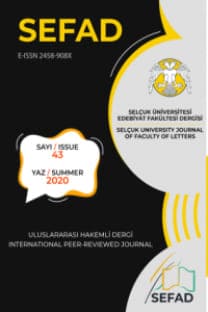Fakirlik, Dickens’ın Oliver Twist Adlı Eseri ve J. R. McCulloch
Oliver Twist, Charles Dickens, Yeni Fakir Kanunu, politik ekonomi, J. R. McCulloch
Poverty, Dickens’s Oliver Twist, and J. R. McCulloch
Oliver Twist, Charles Dickens, New Poor Law, political economy, J. R. McCulloch,
___
- Blake, K. (2009). Pleasures of Benthamism: Victorian literature, utility, political economy. London: Oxford University Press.
- Blaug, M. (1963). The myth of the Old Poor Law and the making of the new. The Journal of Economic History 23(2), 151-84.
- Buzard, J. (2014). Item of mortality: lives led and unled in Oliver Twist. ELH: English Literary History 81(4), 1225-51.
- Courtemanche, E. (2011). The invisible hand and British fiction, 1818-1860. Basingstoke: Palgrave Macmillan.
- Dickens, C. (1965). Letters. Ed. Madeline House et al. Oxford: Oxford University Press.
- Dickens, C. (1988). Oliver Twist. New York: Penguin Books.
- Driver, F. (1993). Power and pauperism: the workhouse system, 1834-1884. New York: Cambridge University Press.
- Fielding, K. J. (1987). Benthamite Utilitarianism and Oliver Twist: a novel of ideas. Dickens Quarterly 4(2), 49-65.
- Gallagher, C. (2006). The body economic: life, death, and sensation in political economy and the Victorian novel. Princeton: Princeton University Press.
- Gilbert, G. (1985). The Morning Chronicle, Poor Laws, and political economy. History of Political Economy 17(2), 507-21.
- Goodlad, L. M. E.. (2003). Victorian literature and the Victorian state: character and governance in liberal society. Baltimore: The Johns Hopkins University Press.
- Himmelfarb, G. (1984). The idea of poverty: England in the early industrial age. New York: Knopf.
- McCulloch, John Ramsey. (1828). Poor Laws. Edinburgh Review 47(94), 303-330.
- O’Brien, D. P. (2003). J. R. McCulloch: a study in classical economics. New York: Routledge.
- Poovey, M. (2008). A history of the modern fact: problems of knowledge in the sciences of wealth and society. Chicago: The University of Chicago Press.
- Poovey, M. (2008). Genres of the credit economy: mediating value in eighteenth- and nineteenth-century Britain. Chicago: The University of Chicago Press.
- Schlicke, P. (1975). Bumble and the Poor Law satire of Oliver Twist. The Dickensian 71, 149-65.
- Stević, A. (2014). Fatal extraction: Dickensian bildungsroman and the logic of dependency. Dickens Studies Annual: Essays on Victorian Fiction 45(1), 63-94.
- Stokes, P. M. (2001). Bentham, Dickens, and the uses of the workhouse. SEL: Studies in English Literature 41(4), 711-27.
- Woodmansee, M & Osteen M (1999). Introduction. The New Economic Criticism: Studies at the Intersection of Literature and Economics, eds. Woodmansee and Osteen. London and New York: Routledge.
- Yayın Aralığı: 2
- Başlangıç: 1981
- Yayıncı: Selçuk Üniversitesi Edebiyat Fakültesi
Yazınsal Onomastik ve Çocuk Yazını Çevirisinde Kişi Adlarının Çevrilebilirliği Üzerine
Mary Julia Young’ın “Kaygı” Sonesinde Nevrotik Zihnin Temsili
Van’da Madde Kullanımı ve Bağımlılığı Etkileyen Ailesel Faktörler
Kimlik Mefhumuna Farklı Pencerelerden Bakmak
Çin’deki Azınlıklar için 20. yy. İki Dilli Eğitim Politikaları Üzerine Bir İnceleme
